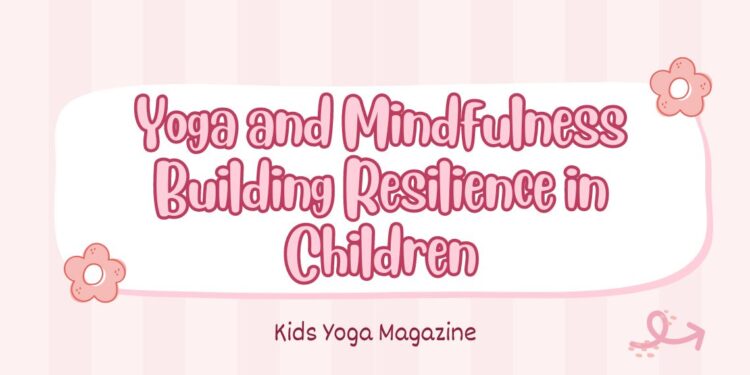In a world where children are increasingly exposed to stress, challenges, and uncertainties, building resilience is more important than ever. Resilience is the ability to bounce back from adversity, adapt to change, and keep going in the face of challenges. While some aspects of resilience are naturally developed over time, yoga and mindfulness offer powerful tools that can actively help children strengthen their emotional and mental resilience. Through these practices, children can learn to manage stress, regulate their emotions, and develop a strong sense of self-efficacy, setting the foundation for a resilient and balanced life.
1. Understanding Resilience in Children
Resilience in children is not just about being tough; it’s about having the inner resources to cope with life’s ups and downs. Resilient children are better equipped to handle stress, overcome obstacles, and recover from setbacks. They are also more likely to have a positive outlook on life and to approach challenges with confidence rather than fear.
Building resilience involves developing several key skills, including emotional regulation, problem-solving, and a growth mindset. Yoga and mindfulness directly contribute to these areas by teaching children how to connect with their emotions, stay present in the moment, and cultivate a calm and focused mind.
2. How Yoga Supports Emotional Regulation
One of the core components of resilience is the ability to regulate emotions. Children who can manage their emotions are better able to stay calm under pressure, think clearly, and make thoughtful decisions. Yoga provides children with a safe space to explore their emotions and develop the tools needed for emotional regulation.
- Breath Awareness: In yoga, children learn to use their breath as a tool to calm their minds and bodies. Breathing exercises, such as Balloon Breathing or 4-7-8 Breathing, help children become more aware of their breath and how it influences their emotions. By focusing on their breath during stressful situations, children can calm their nervous system and reduce anxiety, making it easier to respond to challenges with a clear mind.
- Mindful Movement: Yoga poses require children to focus on their bodies and the sensations they experience in the moment. This mindful movement helps children stay grounded and present, reducing the likelihood of becoming overwhelmed by strong emotions. Poses like Child’s Pose (Balasana) and Tree Pose (Vrksasana) are particularly effective in helping children find balance and calm, even in difficult situations.
3. Mindfulness as a Tool for Stress Management
Mindfulness is the practice of being fully present in the moment, without judgment. It teaches children to observe their thoughts and feelings without getting caught up in them, which is essential for managing stress and building resilience.
- Mindful Observation: Encourage children to practice mindful observation, where they focus on a specific object, sound, or sensation. This could be as simple as listening to the sound of their breath or observing the details of a leaf. This practice helps children develop the ability to focus their attention and avoid becoming overwhelmed by stress.
- Body Scan Meditation: A body scan meditation is a mindfulness practice that helps children tune into their bodies and release tension. By guiding them through a mental scan of their body from head to toe, children learn to recognize areas of stress and consciously relax them. This practice not only reduces physical tension but also promotes mental relaxation, making it easier for children to handle stress.
4. Building a Growth Mindset Through Yoga
A growth mindset is the belief that abilities and intelligence can be developed through effort and learning. Children with a growth mindset are more resilient because they view challenges as opportunities to grow rather than as insurmountable obstacles.
- Challenging Poses: Yoga teaches children to embrace challenges by gradually introducing more difficult poses. When children are encouraged to try a new pose or hold a challenging position, they learn that persistence and effort lead to improvement. This experience reinforces the idea that growth and learning come from trying, even if success isn’t immediate.
- Celebrating Progress: In yoga, small successes are celebrated, whether it’s achieving a new pose, improving balance, or simply showing up to practice. By focusing on progress rather than perfection, children learn to appreciate their efforts and understand that mistakes are part of the learning process. This mindset helps them approach challenges with resilience and confidence.
5. Fostering Self-Compassion Through Mindfulness
Self-compassion is a key component of resilience. It involves treating oneself with kindness and understanding, especially during difficult times. Mindfulness practices help children develop self-compassion by encouraging them to be gentle with themselves and to accept their emotions without judgment.
- Loving-Kindness Meditation: Loving-kindness meditation is a mindfulness practice that involves sending positive thoughts and wishes to oneself and others. Encourage children to repeat phrases like “May I be happy, may I be healthy, may I be safe” during meditation. This practice helps children cultivate self-compassion and develop a supportive inner dialogue, which is essential for resilience.
- Non-Judgmental Awareness: Teach children to observe their thoughts and feelings without labeling them as “good” or “bad.” This non-judgmental awareness allows children to experience their emotions fully without becoming overwhelmed by them. By accepting their emotions as they are, children are better able to move through challenges with resilience.
6. Creating a Mindful Routine for Building Resilience
Incorporating yoga and mindfulness into a child’s daily routine can have lasting benefits for their resilience. Consistency is key, as regular practice helps reinforce the skills and habits that support emotional and mental well-being.
- Morning Mindfulness: Start the day with a short mindfulness practice, such as mindful breathing or a simple yoga sequence. This helps set a positive tone for the day and equips children with the tools they need to handle whatever comes their way.
- Mindful Breaks: Encourage children to take mindful breaks throughout the day, especially during stressful or overwhelming moments. A few minutes of deep breathing or mindful movement can help reset their focus and reduce stress.
- Evening Reflection: End the day with a reflection on what went well and what challenges were faced. Encourage children to express gratitude for their successes and to view challenges as opportunities for growth. This practice helps reinforce a growth mindset and resilience.
Conclusion
Yoga and mindfulness offer powerful tools for building resilience in children. By teaching emotional regulation, stress management, a growth mindset, and self-compassion, these practices help children develop the inner strength they need to navigate life’s challenges with confidence and grace. Incorporating yoga and mindfulness into your child’s daily routine can provide them with a solid foundation for resilience, setting them up for a lifetime of emotional well-being and success. Through these practices, children learn that while they may not be able to control everything that happens to them, they can control how they respond, and that’s where true resilience lies.












